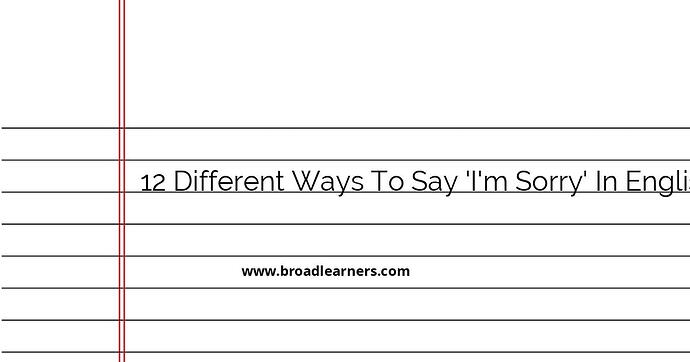Apologizing is an essential part of communication, as it shows our willingness to take responsibility for our actions. Saying 'I'm sorry' is a common way to express remorse, but there are many other phrases you can use to convey the same sentiment. Here are 12 different ways to say 'I'm sorry' in English:
- I apologize
- I regret that
- Forgive me for
- Please accept my apologies
- I beg your pardon
- Excuse me for
- I feel terrible about
- My apologies for
- Regrettably
- I am so sorry for
- Pardon me for
- I humbly apologize
Let's delve into each alternative way to say 'I'm sorry' with examples:
1. I Apologize
'I apologize' is a formal way to express regret and take responsibility for a mistake or offense.
Example:
"I apologize for missing our meeting yesterday. It was completely my oversight."
2. I Regret That
'I regret that' conveys a sense of remorse and disappointment over a situation.
Example:
"I regret that my comments hurt your feelings. That was not my intention."
3. Forgive Me For
'Forgive me for' is a humble way to seek forgiveness for a wrongdoing or error.
Example:
"Forgive me for being late to the presentation. Traffic was unexpectedly heavy."
4. Please Accept My Apologies
'Please accept my apologies' is a courteous and sincere way to ask for forgiveness.
Example:
"I am truly sorry for the mistake I made. Please accept my apologies."
5. I Beg Your Pardon
'I beg your pardon' is a polite and formal way to request forgiveness or to indicate disbelief.
Example:
"I beg your pardon, but I believe there has been a misunderstanding. Let me clarify."
6. Excuse Me For
'Excuse me for' is an apologetic phrase often used in casual situations to acknowledge a mistake.
Example:
"Excuse me for bumping into you earlier. I didn't see you there."
7. I Feel Terrible About
'I feel terrible about' expresses genuine remorse and regret for a specific action or outcome.
Example:
"I feel terrible about forgetting your birthday. I will make it up to you."
8. My Apologies For
'My apologies for' is a simple and direct way to admit fault and express regret.
Example:
"My apologies for the confusion in the report. I will correct it immediately."
9. Regrettably
'Regrettably' is a formal adverb used to express sorrow or disappointment about a situation.
Example:
"Regrettably, I cannot attend the meeting tomorrow due to a prior commitment."
10. I Am So Sorry For
'I am so sorry for' is a heartfelt way to convey deep regret and sorrow for a mistake or offense.
Example:
"I am so sorry for the pain my words caused. I didn't mean to hurt you."
11. Pardon Me For
'Pardon me for' is a polite way to acknowledge a mistake or seek forgiveness in a formal manner.
Example:
"Pardon me for the interruption. I just wanted to clarify a point."
12. I Humbly Apologize
'I humbly apologize' is a humble and sincere way to request forgiveness and show humility.
Example:
"I humbly apologize for any inconvenience my actions may have caused. It was not intentional."
Did I miss anything? Respond below
